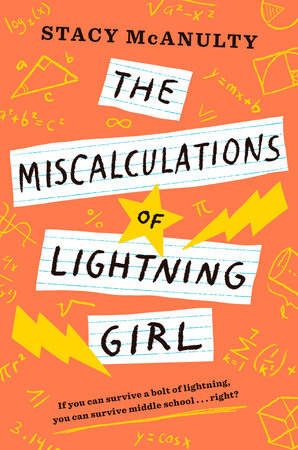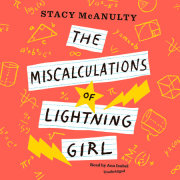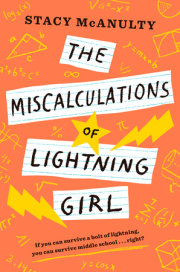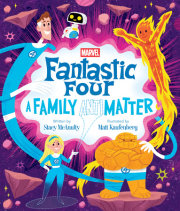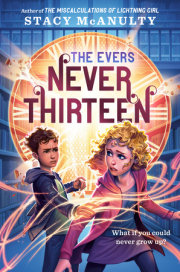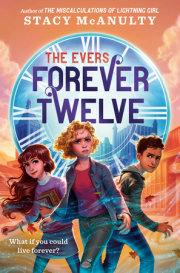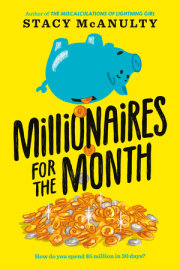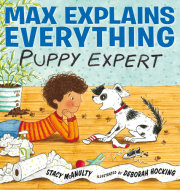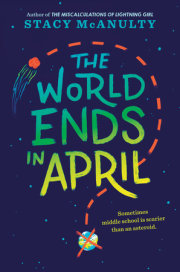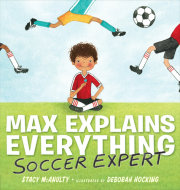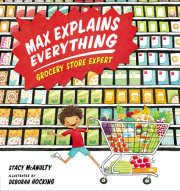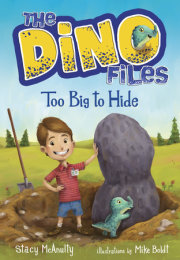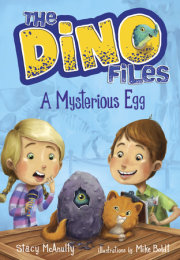I don’t remember the moment that changed my life 4 years ago. Call it a side effect of being struck by lightning. That bolt of electricity burned a small hole in my memory. It also rewired my brain, transforming me into Lucille Fanny Callahan, math genius.
I’ve been told the lightning-strike story 42 times, so it’s almost like my own memory. I see it perfectly: I’m at the Crystal Creek Apartments, where Nana and I lived then. (There’s not really a creek, just a big dirty fountain in front.) I’m playing outside with a girl named Cecelia when the thunderstorm starts. We live in North Carolina, and storms happen all the time in the spring and summer. We watch from behind a toolshed. For some reason, I climb on the chain link fence. Maybe 8-year-old me was a daredevil; 12-year-old me definitely is not.
Lightning strikes the fence, and the electricity runs through the metal links and then through me. Some of the current even jumps from me to Cecelia. I’m knocked out. Cecelia is just knocked over. She runs and gets help. Joe, the maintenance man, uses a defibrillator on me because the electricity from the lightning stopped my heart. The electricity from the defibrillator starts it back up.
I do remember the hospital and the black burns on my pale hands. I remember pretending to be asleep while Nana prayed next to my bed. I only stayed in the hospital 1 night. The doctors did all their tests. They said my heart took a 2- to 5-minute nap. (I hate that no one knows the exact number.) They said I was lucky and I’d be fine. Back to normal in a few days. But doctors are wrong sometimes.
A week later, Nana and I were watching TV, and a commercial came on for a used-car dealership. The man was screaming, so I had to pay attention.
“That’s $359 a month for 48 months, folks.” He was really loud. “Nobody beats Frank Fontana. Nobody.”
I yelled back, “17,232.”
“What?” Nana asked.
“That’s how much the car costs,” I said.
“Did you read it on the TV?”
“I just know. 359 times 48 is 17,232.”
Nana frowned and shook her head. But then she got up and went to find a calculator.
“What were those numbers again?” she asked.
I told her, and she punched them in. “And the answer?”
“17,232.”
“You’re right.” She sounded surprised. I wasn’t surprised, but I guess I should have been. I mean, I was only in 2nd grade, and we were still learning addition and subtraction.
Nana turned off the television.
“What’s 99 times 88?” she asked.
“8,712. Can we have McDonald’s for dinner?” I asked.
Nana ignored me and asked another math problem and then another. She kept using bigger numbers, more digits. But it never got harder.
The doctors call my condition acquired savant syndrome. Savant means that my math skills are far beyond normal, and acquired means I wasn’t born with this wacky ability. I got it because I was holding a metal fence during a lightning storm. Cecelia didn’t get any special powers. We stopped being friends soon after that. I was busy trying to understand my new brain, and in the fall Nana and I moved.
Acquired savant syndrome is caused by brain damage. I can’t say that in front of Nana. She thinks it’s a miracle. My uncle Paul likes to think of it as a superpower, something from a comic book or a movie. But really, I’m brain damaged. Part of my left lobe has been turned off, and now my right lobe works overtime.
My condition is really rare. I’ve never met anyone with it. It’s even rarer in females, and superrare in kids. 1 of my doctors, Dr. Emily Bahri, specializes in savant syndrome. She’s worked with a lady who can make a drawing so realistic it looks like a photo, and with a guy who can speak any language after hearing it only a few times. I’m her only acquired savant patient. Years ago, Dr. Bahri did have a guy who, after hitting his head on the bottom of a swimming pool, could suddenly play the piano. He’d never taken a single lesson. But that guy is dead now from old age.
My supercomputer brain can do more than add, subtract, multiply, and divide (which is no more impressive than a $3 calculator). I can also do calendar math. January 14, 1901, was a Monday. July 2, 1975, was a Wednesday. September 30, 2055, will be a Thursday. (Google can do this, too, and almost as fast.)
I also see math. Every number has its own color and shape. Take the number 5--it’s a jelly bean shape, red-brown, like the color of Carolina mud. The number 12 is a set of cream-colored squares. The number 47 is a fluorescent-orange oval. Prime numbers have curves. Non-primes have hard edges.
These colors and shapes make it fun and easy to play with numbers, and I can find patterns in anything from the stock market to baseball games to the price of cereal. Nana likes to bargain shop.
And then there’s my number memory ability. I remember every set of numbers I hear or see, like license plates or phone numbers or the digits of pi (π).
Pi is my favorite mathematical constant. But because the digits of pi after the point go on forever, I only let myself recite the numbers to the 314th decimal place.
π=3.14159265358979323846264338327950288419716939937510582097494459230781640628620899862803482534211706798214808651328230664709384460955058223172535940812848111745028410270193852110555964462294895493038196442881097566593344612847564823378678316527120190914564856692346034861045432664821339360726024914127372458700660631
These digits repeat in my brain even when I don’t want them to. It’s like getting a song stuck in your head. Only for me, it’s always the same song. Incredibly annoying, but still beautiful.
Being a savant does have its downsides. Like the guy who hit his head in the pool and could play the piano? He was blind after the accident. I’m not blind, but I do have my own issues. When people meet me, they expect Einstein or Maryam Mirzakhani (if they’re familiar with recent mathematical geniuses). But instead, they get the 1 and only freaky-strange Lucy. The girl who can’t sit down without making you stare at her because she needs to do it 3 times. The girl who would rather calculate your age down to the hour than talk about your hobbies. The girl who never leaves the house without a supply of Clorox wipes and hand sanitizer.
Lucky for me--and everybody else--I rarely have to meet people. I’m a reclusive genius.
Copyright © 2018 by Stacy McAnulty. All rights reserved. No part of this excerpt may be reproduced or reprinted without permission in writing from the publisher.

